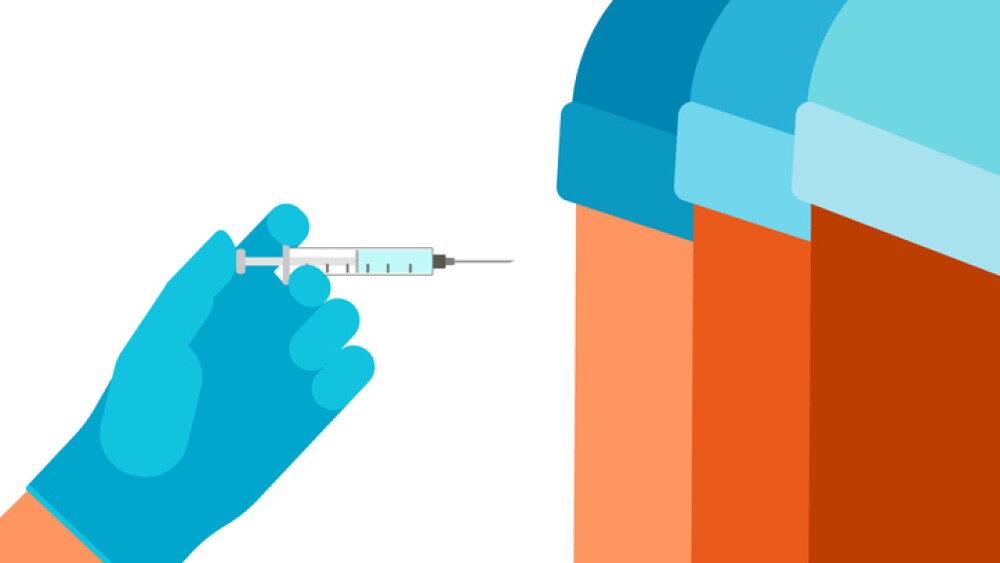OXFORD, England, November 2, 2015 /PRNewswire/ --
Vaccine candidate administered for the first time in humans in a phase I clinical trial led by Oxford University'sJenner Institute, with partners Imaxio and GSK
The Jenner Institute at Oxford University, together with partners Imaxio and GSK, has started a phase I clinical trial of a novel vaccine candidate aimed at blocking transmission of malaria.
(Logo: http://photos.prnewswire.com/prnh/20151102/282685LOGO )
(Logo: http://photos.prnewswire.com/prnh/20151102/282686LOGO )
Around half the world's population is at risk of malaria and the disease led to an estimated 584,000 deaths in 2013. MosquirixTM, a malaria vaccine candidate developed by GSK, has just received a positive scientific opinion from the European Medicines Agency for use in young children. MosquirixTM aims at addressing the objectives set for a first generation vaccine in the WHO malaria vaccine technology roadmap. The roadmap also outlines ambitious goals for second generation vaccines including transmission-blocking vaccines. The latter prevent mosquitoes from transmitting malaria to non-infected persons.
The clinical trial is being conducted at Southampton, the lead trial site, and Oxford. It is a dose escalation study, where amounts of the potential vaccine are increased. The study will assess the safety of the vaccine candidate in people and its ability to generate immune responses that inhibit the growth of malaria eggs in mosquitos, preventing transmission of malaria.
The vaccine candidate, developed by the team led by Dr Sumi Biswas at the Jenner Institute, University of Oxford, is composed of a transmission-blocking antigen from Plasmodium falciparum, the more dangerous form of malaria. The antigen is combined with Imaxio's pro-immunogenic technology IMX313, designed to increase immune responses, and two viral vectors, which are virus carriers modified to be harmless but which can transport the vaccine elements into the body's cells. One of those is a proprietary viral vector from Okairos (acquired by GSK in 2014). It is being administered through a course of treatment developed by the Jenner Institute in Oxford.
"Blocking transmission of malaria by mosquitoes from human to human is increasingly seen as one several complementary ways to fight this very important disease." said Prof. Adrian Hill, Director of the Jenner Institute at Oxford University. "The malaria vaccine programme at the Jenner Institute is now unique in having vaccines against all stages of the parasite's life cycle in clinical development. The combination of technologies from Oxford, Imaxio & GSK is a very promising way to develop a transmission blocking vaccine candidate."
"After a first clinical trial involving our pro-immunogenic technology "IMX313" in 2013, we are very enthusiastic to see it reaching the clinic within a second vaccine candidate", said Mr. Alexandre Le Vert, Chief Executive Officer of Imaxio. "Collaborating with Oxford University's Jenner Institute and GSK in the development of vaccines is a great honour for us and reinforces our confidence in IMX313."
Funding
The trial is partly financed by the European Commission through MultiMalVax, a Collaborative Project funded by the EU's 7th Framework Programme (FP7) and coordinated by the Jenner Institute at the University of Oxford.
About the Jenner Institute at Oxford University
The Jenner Institute was founded in November 2005 to develop innovative vaccines against major global diseases. Uniquely it focuses both on diseases of humans and livestock and tests new vaccine approaches in parallel in different species. A major theme is translational research involving the rapid early-stage development and assessment of new vaccines in clinical trials.
The Institute comprises the research activities of over 28 Jenner Investigators who head leading research groups spanning human and veterinary vaccine research and development. Together the Institute investigators comprise one of the largest non-profit sector research and development activities in vaccinology.
The Institute is a partnership between the University of Oxford and The Pirbright Institute. The Institute is supported by the Jenner Vaccine Foundation, a UK registered charity, and advised by the Jenner Institute Scientific Advisory Board.
For further information, go to http://www.jenner.ac.uk and http://www.jenner.ac.uk/transmission-blocking-vaccines
About Imaxio
Imaxio is a small biotechnology company focused on vaccines, with products ranging from commercial stage to clinical and preclinical R&D stages.
Its clinical-stage R&D pipeline is focused on vaccines for infectious diseases and immunotherapies in oncology. It includes five internal R&D projects plus seven active R&D collaborations, all based on a proprietary antigen re-engineering technology platform, called IMX313, which is designed to improve an antigen's immunogenicity. Using this technology, Imaxio works alongside several prominent international academic and industrial research teams to develop recombinant vaccines for infectious diseases (Influenza, Staphylococcus aureus, Tuberculosis, Malaria) and oncology.
Imaxio also commercializes in the French market a human vaccine indicated for the prevention of an infectious work-related disease, called Spirolept®.
The company owns a solid IP portfolio and collaborates with numerous international partners, including the Jenner Institute at Oxford University (UK). Twelve of the twenty Imaxio employees are dedicated to R&D activities. In 2014 its turnover reached EUR 2.3 million. Imaxio is based in Lyon, France.
For further information: http://www.imaxio.com
Media contact
Jenner Institute at Oxford University
Thomas Calver
thomas.calver@admin.ox.ac.uk
Tel: +44-18-65-27-00-46
SOURCE Jenner Institute at Oxford University and Imaxio S.A
Help employers find you! Check out all the jobs and post your resume.
Vaccine candidate administered for the first time in humans in a phase I clinical trial led by Oxford University'sJenner Institute, with partners Imaxio and GSK
The Jenner Institute at Oxford University, together with partners Imaxio and GSK, has started a phase I clinical trial of a novel vaccine candidate aimed at blocking transmission of malaria.
(Logo: http://photos.prnewswire.com/prnh/20151102/282685LOGO )
(Logo: http://photos.prnewswire.com/prnh/20151102/282686LOGO )
Around half the world's population is at risk of malaria and the disease led to an estimated 584,000 deaths in 2013. MosquirixTM, a malaria vaccine candidate developed by GSK, has just received a positive scientific opinion from the European Medicines Agency for use in young children. MosquirixTM aims at addressing the objectives set for a first generation vaccine in the WHO malaria vaccine technology roadmap. The roadmap also outlines ambitious goals for second generation vaccines including transmission-blocking vaccines. The latter prevent mosquitoes from transmitting malaria to non-infected persons.
The clinical trial is being conducted at Southampton, the lead trial site, and Oxford. It is a dose escalation study, where amounts of the potential vaccine are increased. The study will assess the safety of the vaccine candidate in people and its ability to generate immune responses that inhibit the growth of malaria eggs in mosquitos, preventing transmission of malaria.
The vaccine candidate, developed by the team led by Dr Sumi Biswas at the Jenner Institute, University of Oxford, is composed of a transmission-blocking antigen from Plasmodium falciparum, the more dangerous form of malaria. The antigen is combined with Imaxio's pro-immunogenic technology IMX313, designed to increase immune responses, and two viral vectors, which are virus carriers modified to be harmless but which can transport the vaccine elements into the body's cells. One of those is a proprietary viral vector from Okairos (acquired by GSK in 2014). It is being administered through a course of treatment developed by the Jenner Institute in Oxford.
"Blocking transmission of malaria by mosquitoes from human to human is increasingly seen as one several complementary ways to fight this very important disease." said Prof. Adrian Hill, Director of the Jenner Institute at Oxford University. "The malaria vaccine programme at the Jenner Institute is now unique in having vaccines against all stages of the parasite's life cycle in clinical development. The combination of technologies from Oxford, Imaxio & GSK is a very promising way to develop a transmission blocking vaccine candidate."
"After a first clinical trial involving our pro-immunogenic technology "IMX313" in 2013, we are very enthusiastic to see it reaching the clinic within a second vaccine candidate", said Mr. Alexandre Le Vert, Chief Executive Officer of Imaxio. "Collaborating with Oxford University's Jenner Institute and GSK in the development of vaccines is a great honour for us and reinforces our confidence in IMX313."
Funding
The trial is partly financed by the European Commission through MultiMalVax, a Collaborative Project funded by the EU's 7th Framework Programme (FP7) and coordinated by the Jenner Institute at the University of Oxford.
About the Jenner Institute at Oxford University
The Jenner Institute was founded in November 2005 to develop innovative vaccines against major global diseases. Uniquely it focuses both on diseases of humans and livestock and tests new vaccine approaches in parallel in different species. A major theme is translational research involving the rapid early-stage development and assessment of new vaccines in clinical trials.
The Institute comprises the research activities of over 28 Jenner Investigators who head leading research groups spanning human and veterinary vaccine research and development. Together the Institute investigators comprise one of the largest non-profit sector research and development activities in vaccinology.
The Institute is a partnership between the University of Oxford and The Pirbright Institute. The Institute is supported by the Jenner Vaccine Foundation, a UK registered charity, and advised by the Jenner Institute Scientific Advisory Board.
For further information, go to http://www.jenner.ac.uk and http://www.jenner.ac.uk/transmission-blocking-vaccines
About Imaxio
Imaxio is a small biotechnology company focused on vaccines, with products ranging from commercial stage to clinical and preclinical R&D stages.
Its clinical-stage R&D pipeline is focused on vaccines for infectious diseases and immunotherapies in oncology. It includes five internal R&D projects plus seven active R&D collaborations, all based on a proprietary antigen re-engineering technology platform, called IMX313, which is designed to improve an antigen's immunogenicity. Using this technology, Imaxio works alongside several prominent international academic and industrial research teams to develop recombinant vaccines for infectious diseases (Influenza, Staphylococcus aureus, Tuberculosis, Malaria) and oncology.
Imaxio also commercializes in the French market a human vaccine indicated for the prevention of an infectious work-related disease, called Spirolept®.
The company owns a solid IP portfolio and collaborates with numerous international partners, including the Jenner Institute at Oxford University (UK). Twelve of the twenty Imaxio employees are dedicated to R&D activities. In 2014 its turnover reached EUR 2.3 million. Imaxio is based in Lyon, France.
For further information: http://www.imaxio.com
Media contact
Jenner Institute at Oxford University
Thomas Calver
thomas.calver@admin.ox.ac.uk
Tel: +44-18-65-27-00-46
SOURCE Jenner Institute at Oxford University and Imaxio S.A
Help employers find you! Check out all the jobs and post your resume.




